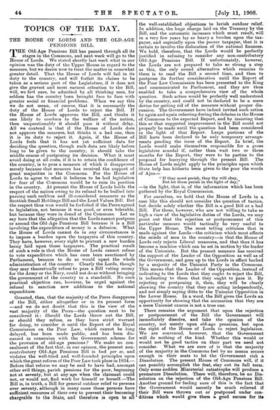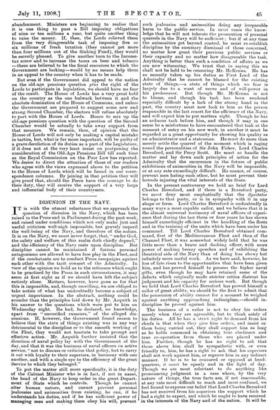TOPICS OF THE DAY.
THE HOUSE OF LORDS AND THE OLD-AGE PENSIONS BILL.
THE Old-Age Pensions Bill has passed through all its stages in the Commons, and next week will go to the House of Lords. We stated shortly last week what in our opinion was the duty of the Upper House in regard to the measure, but we desire now to treat the matter in somewhat greater detail. That the House of Lords will fail in its duty to the country, and will forfeit its claims to be taken as a serious part of the Legislature, if it does not give the gravest and most earnest attention to the Bill, will, we feel sure, be admitted by all thinking men, for seldom has the country been brought face to face with greater social or financial problems. When we say this we do not mean, of course, that it is necessarily the duty of the House of Lords to reject the Bill. If the House of Lords approves the Bill, and thinks it one likely to conduce to the welfare of the nation, then unquestionably it should pass it without delay. All we contend is that if the House of Lords does not approve the measure, but thinks it a bad one, then it is its duty to reject it. Again, if the House of Lords feels that it has not yet sufficient data for deciding the question, though such data are likely before long to be given to the country, it should take the middle course of postponing its decision. What it must avoid doing at all costs, if it is to retain the confidence of the country, is to pass a measure of which it disapproves merely because that measure has received the support of great majorities in the Commons. For the House of Lords to agree to what it believes to be bad legislation for fear of the Commons would be to ruin its position in the country. At present the House of Lords holds the respect of the nation owing to its refusal to be bullied into passing such reckless and ill-considered measures as the Scottish Small Holdings Bill and the Land Values Bill. But the respect thus won would be forfeited if the Peers agreed to legislation, not because it was good, or even tolerable, but because they were in dread of the Commons. Let us say here that the allegation that the Lords cannot postpone or amend the Old-Age Pensions Bill because it is a Bill involving the expenditure of money is a delusion. What the House of Lords cannot do in any circumstances is to impose a burden upon the taxpayers of this country. They have, however, every right to prevent a new burden being laid upon those taxpayers. The practical result of such a rule is that the House of Lords cannot refuse to vote expenditure which has once been sanctioned by Parliament, because to do so would upset the whole administration of the country. Clearly the Lords, though they may theoretically refuse to pass a Bill voting money for the Army or the Navy, could not do so without bringing the government of the country to a standstill. No such practical objection can, however, be urged against the refusal to sanction new additions to the national expenditure.
Granted, then, that the majority of the Peers disapprove of the Bill, either altogether or in its present form —and we do not doubt that this is the view of the vast majority of the Peers—the question next to be considered is : Should the Lords throw out the Bill, or should they refuse, as they have strict warrant for doing, to consider it until the Report of the Royal Commission on the Poor Law, which cannot be long delayed, has been made public, and has been dis- cussed in connexion with the Government scheme for the provision of old-age pensions ? We make no con- cealment of the fact that, in our opinion, the present non- contributory Old-Age Pensions Bill is bad per se, and violates the well-tried and well-founded principles upon which the great reform of the Poor Law took place in 1834.— Before that reform we may be said to have had, amongst other evil things, parish pensions for the poor, beginning not at seventy, but at any age when the claimant could not, or would not, find work for himself or herself.—The Bill is, in truth, a Bill for general outdoor relief to persons over seventy, although in many cases those persons have sufficient resources of .their own to prevent their becoming chargeable to the State, and therefore is open to all the well-established objections to lavish outdoor relief. In addition, the huge charge laid on the Treasury by the Bill, and the automatic increases which must result, will in a very few years lay so heavy a burden upon the tax- payer, and especially upon the poorer taxpayer, that it is certain to involve the dislocation of the national finances. We bold, therefore, that the Lords would be perfectly justified in refusing to consider any non-contributory Old-Age Pensions Bill. If unfortunately, however, the Lords are not prepared to take so strong a step as this, the only sound alternative which remains to them is to read the Bill a second time, and then to postpone its further consideration until the Report of the Poor Law Commission has been presented to the King and communicated to Parliament, and they are thus enabled to take a, comprehensive view of the whole question. Such action would be perfectly well understood by the country, and could not be declared to be a mere device for getting rid of the measure without proper dis- cussion. The Government have indeed invited such action by again and again referring during the debates in the House of Commons to the expected Report, and by insisting that this or that suggested improvement in the Bill could not properly be made until the question had been considered in the light of that Report. Large portions of the Bill have been declared to be only temporary arrange- ments pending the issue of the Report. In brief, the Lords would make themselves responsible for a gross legislative scandal if, rather than wait two or three months for the Report, they were to be parties to the proposal for hurrying through the present Bill. The House of Lords might apply to the principles upon which State help has hitherto been given to the poor the words of Ajax— "If they must perish, they thy will obey, But let them perish in the light of day," —in the light, that is, of the information which has been gathered by the Royal Commission.
For ourselves, we bold that the House of Lords in a case like this should not consider the question of tactics, but decide solely whether the Bill is a good Bill oc a bad Bill. For those, however, who are not willing to take so high a view of the legislative duties of the Lords, we may point out that the rejection or postponement of this particular measure would tactically be very useful to the Upper House. The most telling criticism that is made against the Lords—the criticism which most affects the minds of men in the country—is that the House of Lords only rejects Liberal measures, and that thus it has become a machine which can be set in motion by the leader of the Unionists. But the present measure has received the support of the Leader of the Opposition as well as of the Government, and goes up to the Lords in effect backed by a majority of the Unionist Party in the Commons. This means that the Leader of the Opposition, instead of indicating to the Lords that they ought to reject the Bill, is indicating to them that they ought to pass it. By rejecting or postponing it, then, they will be clearly showing the country that they are acting independently, and not simply saying ditto to the Unionist Opposition in the Lower House. In a word, the Bill gives the Lords an opportunity for showing that the accusation that they are a mere Unionist caucus is not a true one.
There remains the argument that upon the rejection or postponement of the Bill the Government will immediately dissolve, and take the opinion of the country, not merely upon old-ago pensions, but upon the right of the House of Lords to reject legislation. We are convinced, however, that the Government will do nothing of the kind. Whether this would or would not be good tactics on their part we need not consider. What we are sure of is that the majority of the majority in the Commons feel by no means secure enough in their seats to let the Government risk a Dissolution. The present House of Commons will, if it can possibly accomplish the feat, stay out its full term. Only some sudden Ministerial catastrophe will produce a premature Dissolution. There will, therefore, be no Dis- solution on the rejection of the Old-Age Pensions Bill. Another ground for feeling sure of this is the fact that the Government would secretly be much relieved if their Bill were thrown out or postponed under con- ditions which would give them a good excuse for ita
abandonment. Ministers are beginning to realise that it is one thing to pass a Bill imposing obligations of nine or ten millions a year, but quite another thing to raise the money. If, then, the Lords relieved them from the very disagreeable task of imposing five or six millions of fresh taxation (they cannot get more than four millions out of the Sinking Fund), they would be secretly pleased. To give another turn to the Income- tax screw and to increase the taxes on beer and tobacco —these are believed to be the fiscal resources to which the Government are looking—would by no means help them in an appeal to the country when it has to be made.
But even if the Government did appeal to the nation on the old-age pensions question plus the right of the Lords to participate in legislation, we should have no fear of the result. The House of Lords has a very great hold on the country as the one bulwark between it and the absolute domination of the House of Commons, and unless the Government are prepared to suggest some new and strong Second Chamber, the electors will refuse absolutely to part with the House of Lords. Hence to mix up the old-age pensions question with the question of the Second Chamber would be actually to take away support from that measure. We remain, then, of opinion that the House of Lords will not only be making a capital mistake in tactics but, what is far more important, will be guilty of a grave dereliction of its duties as a part of the Legislature, if it does not at the very least insist on postponing the consideration of the Old-Age Pensions Bill till such time as the Royal Commission on the Poor Law has reported. We desire to direct the attention of those of our readers who agree with the views expressed above to the petition to the House of Lords which will be found in our corre- spondence columns. By joining in that petition they will give proof that, should the Peers have the courage to do their duty, they will receive the support of a very large and influential body of their countrymen.







































 Previous page
Previous page